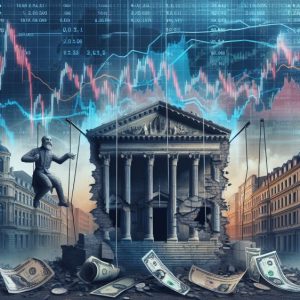
Updated Feb 15, 2024
Strategic Planning: Why You Shouldn’t Fear Market Crashes in Dividend Investing
In the stock market, strategic planning is the compass the savvy investor navigates, especially regarding the robust world of dividend investing. Market crashes, those storms that send the unprepared into frenzied despair, are not to be feared but to be approached as a grandmaster views the chessboard—with calculated foresight and unshakeable calm.
The astute investor, armed with the wisdom of Buffett and the strategic understanding of Sun Tzu, knows that crashes are but ripples in the vast ocean of the market. They are moments when the wheat is separated from the chaff, when the emotional are culled and the rational rise. In the ashes of a crash, the seeds of opportunity are sown—ripe for the investor who has prepared their fields with the foresight of strategic planning.
Dividend investing, in particular, is a testament to the power of resilience. It is the art of drawing steady streams from the well of corporate profits, regardless of the market’s roiling moods. Like a stoic philosopher, the dividend investor remains unfazed when the market plunges into the depths. They understand that the essence of strategic planning is not to predict the market’s every move but to build a fortress that can withstand its sieges—a portfolio robust with dividends that flow continuously, even when the forces of fear besiege the market’s gates.
The market’s waves are not to be timed with precision but ridden with skill. The investor who tries to catch the exact crest or trough is like a surfer who turns their back on the sea—inevitably caught off guard. Instead, the seasoned investor watches for the signs, the subtle shifts in sentiment, the whispers of change. They know that when fear grips the market, it is not a signal to retreat but to advance, to gather the undervalued gems left behind in the panic.
This is the dance of strategic planning in dividend investing, where the brilliant do not merely survive market crashes—they thrive. They move with the market’s rhythm, stepping back when others leap forward, advancing when others flee. They are the investors who, through careful planning and unwavering discipline, turn the market’s cacophony into a symphony of gains.
So, let the market crash! Let it roar and rage! For the investor who has mastered the art of strategic planning in dividend investing, every downturn is a prelude to greater heights, every crash a chorus heralding the next act of their financial triumph.
During market crashes, legendary investors like Warren Buffett, Seth Klarman and Benjamin Graham haven’t merely hunted for bargains; they’ve rigorously evaluated the resilience of their portfolios. A crash serves as a litmus test, revealing which holdings are fundamentally sound and which are not. They scrutinize their portfolios, identifying the weak links and reinforcing positions that exhibit actual value. For them, a market crash isn’t chaos; it’s a stringent audit of their investment thesis.
Buffett’s Berkshire Hathaway made a calculated move during the 2008 financial crisis, investing $5 billion in Goldman Sachs. This was not a gamble but a strategic play based on Buffett’s assessment of Goldman’s intrinsic value and its potential for recovery. The move paid off handsomely as markets stabilized and Goldman Sachs rebounded, vindicating Buffett’s decision.
Seth Klarman, the value-investing savant at the helm of the Baupost Group, is another example. During the dot-com bubble burst in the early 2000s, Klarman’s patient and value-oriented approach allowed him to avoid the speculative frenzy and instead pick up distressed bonds at bargain prices. As the market recovered, these bonds appreciated significantly, rewarding Klarman’s foresight and discipline.
These investors teach us that a market crash is not a signal to retreat but to reevaluate. They embrace the volatility, using it to weed out investments that lack solid fundamentals and increase their stake in those that promise long-term value. It’s a calculated culling process that positions their portfolios to withstand future shocks and thrive.
Buffett and Klarman don’t simply ride out the storm—they navigate it precisely, using the downturn to purchase assets at depressed prices that they believe will deliver outsized returns in the long run. This approach is not for the faint-hearted; it requires an unwavering conviction in one’s investment philosophy and an unshakable trust in rigorous analysis.
A market crash, therefore, is less about the immediate impact and more about the strategic opportunities it presents. While others panic-sell, the astute investor is busy recalibrating, ensuring that when the dust settles, their portfolio emerges not just unscathed but enhanced. This is the art of navigating market downturns, a discipline practised by the most successful investors in the history of the financial markets.
Unlock New Ideas: Inspiring Articles

Crowd Behavior Psychology: Deciphering, Mastery, and Success

Inflation vs Deflation vs Stagflation: Strategies for Triumph

What Is The Best Way For One To Recover After a Financial Disaster?

The Psychology of Investing: Shifting Focus from the Crowd to the Trend

What Development In The Late 1890s May Well Have Prevented Another Financial Disaster?

Mass Psychology of Stocks: Ride the Wave to Win

How Inflation Erodes Debt and Strategies for Smart Investing

Demystifying StochRSI Strategy: Easy Strategies for Winning

From Rags to Riches: Stock Market Investing Success Stories

Winning the loser’s game: timeless strategies for successful investing

Stock Market Crash Recession Is A Done Deal: Wishful Thinking

Best Gold ETFs: A Shrewd Investment Choice

Personal Portfolio Management: Essential for Success

Free Stock Trading Resources: Accelerate Your Knowledge Journey



